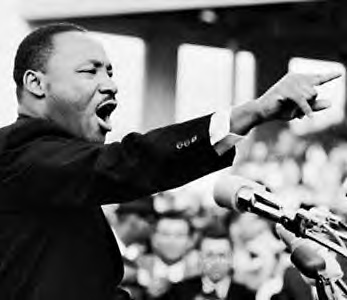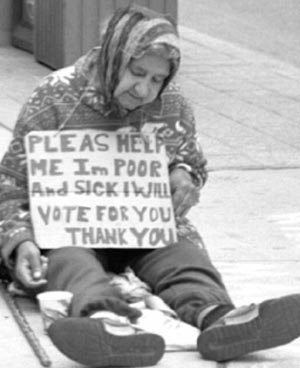
당시는 1968년. 빈곤 계층에 속하는 미국인이 2,500만 명이었다. 그리고 40년 후인 현재 여전히 빈곤 속에 살아가고 있는 이들은 대략 3,700만 명. 1968년, 최저 임금은 현 달러 시세로 시간 당 9달러 47센트(인플레이션이 적용된 2007년 수치). 현재 최저 임금은 6달러 55센트이다. 그리고 현재 4,700만 명의 미국인들이 건강보험이 없다. 2007년에는 주택 담보물 회수 권리 상실에 대한 고소(home foreclosure filings) 건수가 220만 건까지 불어났다. 가난한 이들이 설 땅을 잃었다.
하지만 상황이 바뀌고 있다. 하나님의 역사는 지금도 진행 중이다. 기독인들은 하나님이 공의를 세우기 원하신다는 것을 재발견하며 자신의 과제로 받아들이고 있다. 교회는 정치적 노선과 종파적 구분을 한데 아울러 함께 힘을 모아 빈곤 문제에 대항하고 있다. 미국 사회가 중요한 새로운 국면을 맞이하고 있다.
4년 전, 초교파 빈곤 퇴치 운동 연합인 <콜 투 리뉴얼>(Call to Renewal, 부흥을 위한 소명)은 12일간의 ‘빈곤 극복 버스 투어’(Rolling to Overcome Poverty)를 펼쳤다. 그러나 최선을 다했음에도 불구하고 ‘빈곤’이라는 단어는 2004년 대선 논쟁에서도, 다른 선거 운동에서도 반향을 일으키지 못했다.
그러나 올해는 진작부터 분위기가 달랐다. 수 년 만에 처음으로 빈곤 문제가 의제로 다시 채택되었다. 양당의 대선 예비 후보들이었던 존 에드워즈 상원 의원과 마이크 허커비 공화당 의원은 일을 하는 저소득 빈민들을 선거 기간 최우선 고려 대상으로 꼽았다. 에드워즈는 선거 운동 당시 유창한 언변으로 미국에 빈곤이 실재함을 설파했으며, 10년 안에 미국의 빈곤을 반으로 줄이겠다고 힘주어 약속했다.
허커비는 아칸소 주지사였을 당시, 빈곤 계층에 대한 지원을 주창했다. 이는 공화당 내 경제 보수파들에 반하는 행동이었다. 허커비는 줄곧 사회의 보수파임에도 불구하고 빈곤 극복에 대한 지원을 지지하지 않는 당내 경제 보수파들에게 곱지 않은 시선을 받고 있다. 허커비는 그들의 입장에 반대한다.
<소저너스>는 이 두 후보와의 인터뷰를 진행했다. 그리고 두 후보 모두 대통령 지도력의 중요성을 알고 있음을 강조했다. 에드워즈는 자신의 선거 운동을 언급하면서 “선거 운동 과정을 거치며, 그리고 뉴올리언즈의 여러 곳을 다니면서 미국인들이 빈곤 문제 해결에 호응할 것이라는 사실을 확인할 수 있었다. 그리고 설사 그들이 반응을 보이지 않는다 하더라도 그 때문에 우리가 빈곤 문제를 해결하기 위한 노력을 중단할 수 있겠는가?
“이 걸음이 길고 지루한 힘겨운 걸음이라는 이유 때문에 우리가 하기로 한 일을 하지 않는 상당히 정치적인 결정을 내릴 것인가? 나는 그러지 않을 것이다. 사람들이 무엇을 하고자 하는지를 이해할 뿐 아니라 바로 그 길로 그들을 이끄는 것 또한 지도자의 책임이다. …… 국가 지도자인 대통령으로서 일관된 지도력 없이는 중대한 어떤 일을 해내기는 극히 어렵다.”
또한 마이크 허커비는 다음과 같이 말했다. “엄청난 부를 자랑하는 나라에서 매일같이 고픈 배를 움켜쥐고 잠자리에 드는 사람들이 주목할 만한 수치라면 이는 비극이다. 어떤 이들은 이 땅에 살면서 그러한 진실을 망각하고 있다. 그들은 마치 ‘그런 사람들은 눈에 안 보이니 존재하지 않는다’고 생각하는 것 같다. 거품 정치가 다인 줄 아는 많은 이들은 자신들을 좌지우지하는 사람들이 보여주는 정치의 허실만 보게 된다는 것은 커다란 비극 중 하나이다. 그것이 바로 내가 정치에 뛰어든 이유 중 하나이기도 하다. 바로 권력의 자리에 있는 많은 사람들은 자신들이 열심히 이끌어가고 있는 바로 그 세상이 어떤 것인지 깨닫지 못한다는 것. 그 사실에서 나는 좌절을 느꼈다.”
올해 대통령 선거 후보로 거의 확실시 된 두 명의 후보 지명자들은 그들이 새 정부를 꾸려갈 경우 빈곤 문제가 중요한 우선순위가 될 것이라고 말했다.

한 주 후 열린 <컴패션 포럼>(the Compassion Forum)에서 바락 오바마는 10년 안에 빈곤을 절반까지 줄이겠다는 목표를 수행할 것인지에 대해 이렇게 대답했다. “나는 정말로 그 약속을 지킬 것이다. 내가 그 약속을 할 때는 그것이 바로 내가 오랫동안 품어온 목표이기 때문에 더욱 겸허함으로 약속하고 있음을 이해할 수 있기를 바란다. 그리고 우리는 이 사회를 움직여 빈곤을 줄여갈 뿐 아니라 더 많은 이들이 빈곤으로 떨어져나가는 것을 막아야 할 것이다.”
그러나 미국인들이 바라는 것이 더 있다. 공화당 여론조사가 짐 맥러플린(Jim McLaughlin)이 행한 조사에 따르면, 응답자의 56%가 매체에 대해 “대선 운동 기간 동안 미국의 빈곤 문제를 해결하기 위한 사안을 다루는 데 충분한 시간을 할애하고 있지 않다”고 대답했다. 또한 51%는 “선거 운동 기간 동안 빈곤 문제를 해결하기 위해 필요한 일이 무엇인지에 대해 충분히 듣지 못했다”고 대답했다.
누가 대통령으로 선출되든지 간에, 빈곤 해결은 진보주의자와 보수주의자 따로 없이 모든 이들의 협력이 필요하다. 사적 영역(노사 간)과 비영리 영역(종교 조직을 포함해서), 그리고 공적 영역(모든 수준에서의 정부 - 지방, 주, 국가)의 힘들을 유용할 수 있는 포괄적인 계획이 필요할 것이다. 각 영역이 자신의 몫을 감당하고 최선을 다하는 일에 집중해야 한다. 더욱 중요하게는, 우리 모두가 새 대통령이 책임을 다할 수 있도록 추동해내는 운동을 지속적으로 펼쳐가야 할 것이다.
미국에서의 참된 변화를 가로막고 있는 힘은 결코 만만치 않다. 정치는 내부에서 변화가 가능할 것 같지 않다. 누가 이기든 상관없이, 그들이 얼마나 진심어리든지 상관없이, 내부에서부터 변화가 일어나지 않으면 의미 있는 변화를 기대할 수 없으며, 그리고 그러한 변화를 볼 때까지 우리는 정치 밖의 영역에서 빈곤을 중대하게 줄여나가기 위한 참된 사회 운동을 펼쳐야 한다. 그리고 그러한 사회 운동은 대체로 영적 기반을 가진다. 그 운동은 이미 시작되었으며 그 운동을 확장시켜 나가는 것이 지금 우리의 최우선의 과제이다. 미국과 전 세계에 빈곤이 만연한 이 부끄러운 현실을 이제는 끝장낼 때이다.
짐 월리스 / <소저너스> 편집장. <소저너스, 2008. 9~10월호>
번역 최봉실
A solution to poverty will take both liberals and conservatives and those who are neither
Forty years ago, Martin Luther King Jr. was shot down in Memphis, just as he was about to lead a new Poor People’s Campaign. King’s agenda had moved beyond civil rights to overcoming poverty in America, and he had just begun the new effort to challenge economic injustice.
At that time, in 1968, there were 25 million people in America living in poverty; 40 years later there are roughly 37 million people still living in poverty. In 1968, the minimum wage was worth $9.47 an hour in today’s dollars (using inflation-adjusted 2007 figures). The minimum wage today is $6.55. Forty-seven million Americans have no health insurance. In 2007, the number of home foreclosure filings rose to 2.2 million. The poor have lost ground.
But things are changing. God is on the move. Christians are rediscovering and embracing God’s concern for justice. The church is uniting across political and denominational lines around a shared commitment to fight poverty. A new moment is dawning.
Four years ago, Call to Renewal conducted a 12-day “Rolling to Overcome Poverty” bus tour to say that poverty was a religious and electoral issue. Despite our best efforts, the word “poverty” was rarely spoken in either campaign or in the 2004 presidential debates.
THIS YEAR, it’s already very different. For the first time in many years, poverty is back on the agenda. Two presidential candidates from both parties, Sen. John Edwards and Gov. Mike Huckabee, made poor and low-income working people a central priority in this election season. In Edwards’ campaign, he spoke eloquently about the reality of poverty in the United States and emphasized his commitment to cut poverty in the U.S. in half in 10 years.
When Huckabee was governor of Arkansas, he advocated spending money on poor people - behavior that is offensive to the economically conservative wing of the Republican Party. Even though Huckabee is a consistent social conservative, he is considered suspect by the party’s economic conservatives who, of course, don’t support spending money on overcoming poverty. Huckabee disagrees with them.
We interview both in this issue of Sojourners. And both made a point of identifying the importance of presidential leadership. Commenting on his campaign, Edwards said, “What I saw on the campaign trail and what I have seen in places like New Orleans demonstrates to me that the American people will respond. And even if they didn’t, would that stop us anyway?
Are we going to make some political decision that because this is a difficult trudge, we’re not going to do what we’re supposed to do? Not me. It’s a leadership responsibility not just to figure out what people want to do, but to take them to the right place. … Without sustained presidential, national leadership, it’s extremely hard to do something serious.”
And, Mike Huckabee noted, “It’s a tragedy that in a country of extraordinary wealth significant numbers of people every day go to bed hungry. Some people are oblivious to that reality in this country; it’s almost as if they think, ‘If we don’t see people, then they don’t exist.’ That, to me, is one of the great tragedies - that many people who end up in the bubble of politics see only what is allowed into that bubble by the people who handle them. It’s one of the reasons I got involved - the frustration that many people in positions of authority were unaware of the very world that they were supposedly trying to lead.”
THE TWO PRESUMPTIVE nominees for president this year have also said poverty would be a priority for them in a new administration.
On the anniversary of Martin Luther King’s death in April, John McCain said, “Some people lament privately, others are brave enough to take their call for change to the public arena. Martin Luther King III has done his father’s legacy proud this week by courageously insisting that our nation’s next leader do something about the poverty that ensnares over 36 million of our citizens. I will answer his call, and tell him and the American people today that I will make the eradication of poverty a top priority of the McCain administration.”
A week later, at the Compassion Forum, when asked if he would commit to a goal of cutting poverty in half in 10 years, Barack Obama responded, “I absolutely will make that commitment. Understand that when I make that commitment, I do so with great humility because it is a very ambitious goal. And we’re going to have to mobilize our society, not just to cut poverty, but to prevent more people from slipping into poverty.”
The American people, however, would like more. A recent survey conducted by Republican pollster Jim McLaughlin found that 56 percent of respondents think the media is not spending “an adequate amount of time during the presidential campaign covering the issue of how to fight poverty in the U.S.,” and 51 percent say they “had not heard enough during the presidential campaign about what needs to be done to fight poverty.”
Whoever is elected president, a solution to poverty will take both liberals and conservatives and those who are neither. It will require a comprehensive plan that utilizes the strengths of the private sector (business and unions), the nonprofit sector (including faith-based organizations), and the public sector (government at all levels - local, state, and national). Each must do its share and focus on what it does best. Most important, it will require all of us to continue building a movement to hold a new president accountable.
The forces arrayed against real change in the U.S. are most formidable. Politics is unlikely to be changed merely from within - no matter who wins, and no matter how sincere they are, we will not see significant change unless, and until, we have a real social movement for serious poverty reduction from outside of politics. And that kind of social movement usually has spiritual foundations. That movement has already begun and building it is now our primary task. It’s time to end the scandal of poverty in this country and around the world.
Jim Wallis / editor-in-chief of <Sojourners>. ‘A New Moment Dawning’ by Jim Wallis. Sojourners Magazine, September/October 2008 (Vol. 37, No. 9, pp. 5).
저작권자 © NEWS M 무단전재 및 재배포 금지


